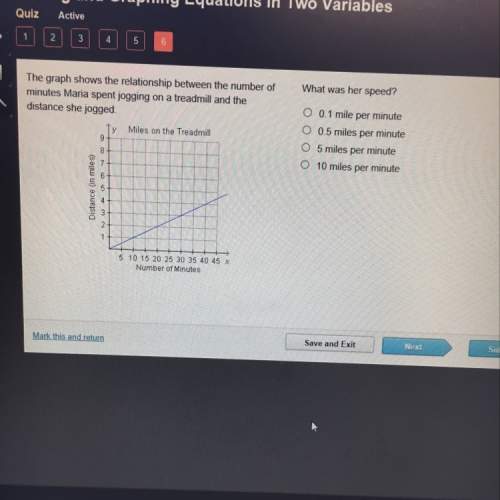Determine whether each sequence is arithmetic or geometric. find the next three terms.
14, 19,...

Mathematics, 27.08.2019 21:00 PearlJam819
Determine whether each sequence is arithmetic or geometric. find the next three terms.
14, 19, 24, 29, . .
a. geometric, 34, 39, 44
b. arithmetic, 32, 36, 41
c. arithmetic, 34, 39, 44
d. the sequence is neither geometric nor arithmetic.
i think this is
c.? what are the first four terms of an arithmetic sequence if the common difference is 1.5 and the first term is 15?
a.15, 30, 45, 60
b.15, 16.5, 18, 19.5
c.15, 22.5, 33.75, 50.625
d. none of the above this is
b.?

Answers: 1
Another question on Mathematics

Mathematics, 22.06.2019 00:00
Technicians have installed a center pivot, circular irrigator for a farm that covers 25 acres. a.) how long is the irrigation boom (in feet) from the center pivot to its farthest extent? b.) if the irrigation boom makes 4 full revolutions in a day, how many miles does the end of the boom travel in 5 days?
Answers: 1

Mathematics, 22.06.2019 00:00
Rewrite the equation x = 65 - 60p by factoring the side that contains the variable p.
Answers: 2


Mathematics, 22.06.2019 03:50
Arandom sample of n = 25 observations is taken from a n(µ, σ ) population. a 95% confidence interval for µ was calculated to be (42.16, 57.84). the researcher feels that this interval is too wide. you want to reduce the interval to a width at most 12 units. a) for a confidence level of 95%, calculate the smallest sample size needed. b) for a sample size fixed at n = 25, calculate the largest confidence level 100(1 − α)% needed.
Answers: 3
You know the right answer?
Questions

Mathematics, 01.10.2019 22:00




Mathematics, 01.10.2019 22:00





Chemistry, 01.10.2019 22:00

Mathematics, 01.10.2019 22:00



Mathematics, 01.10.2019 22:00

Social Studies, 01.10.2019 22:00

Mathematics, 01.10.2019 22:00


Biology, 01.10.2019 22:00





